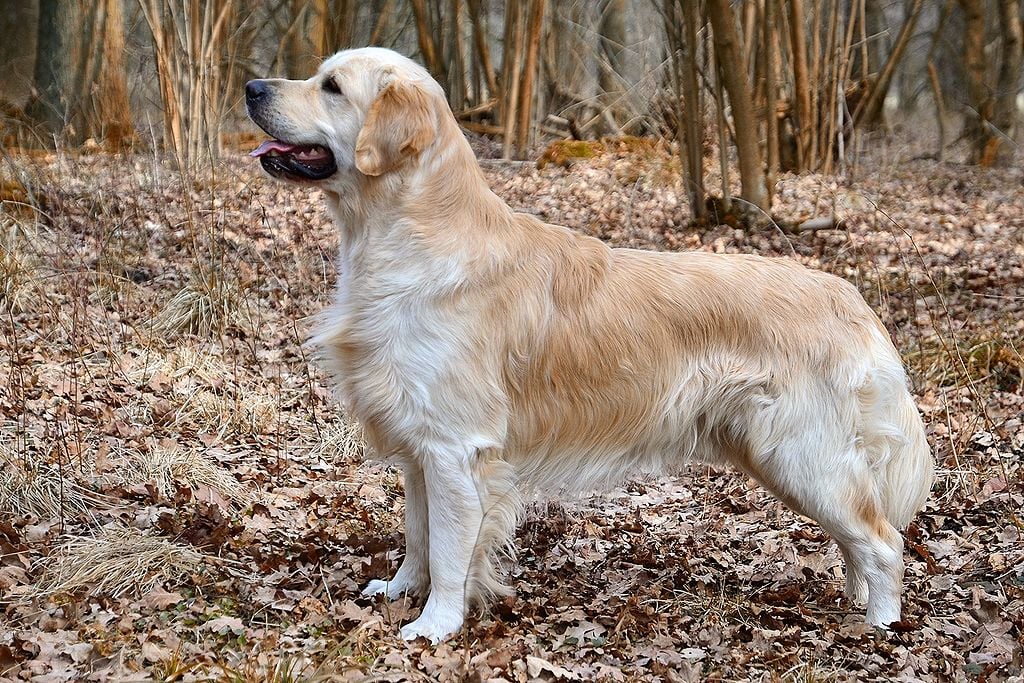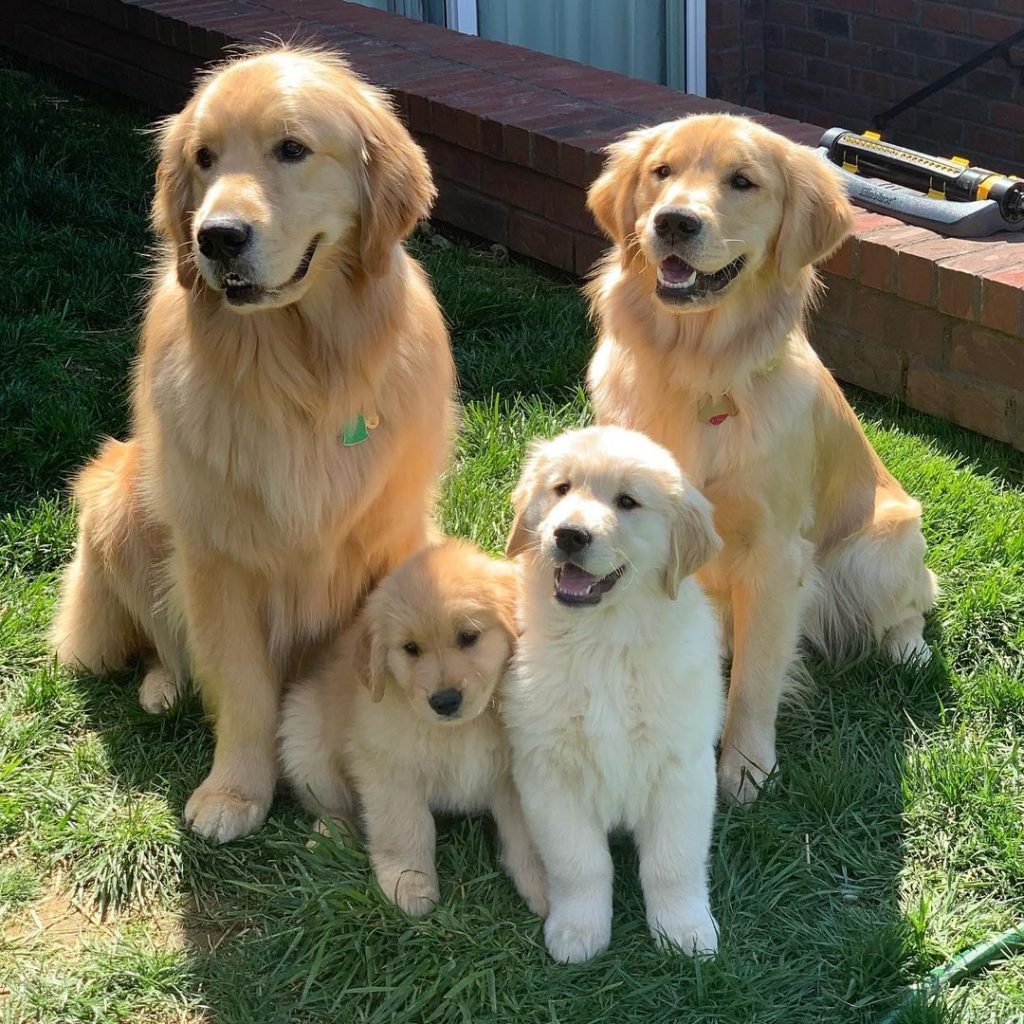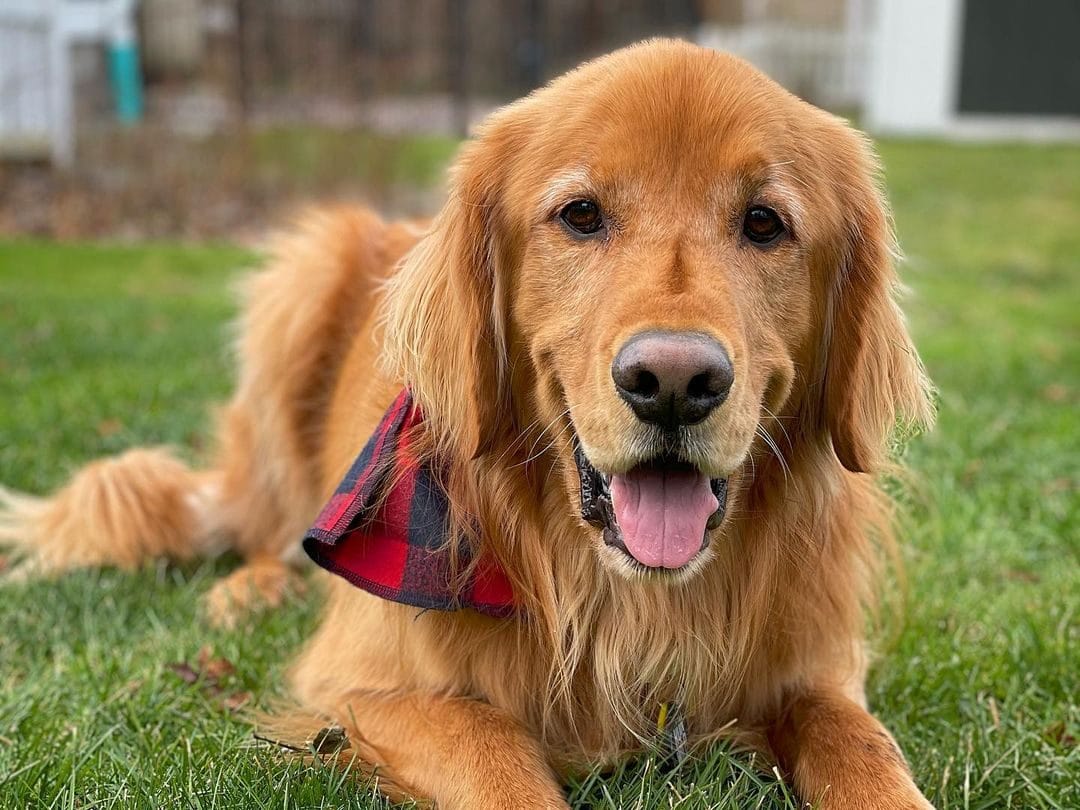
You may know Golden Retrievers by their signature color, gorgeous feathering, floppy ears, or sunny dispositions. These water-loving, playful pups were originally bred to retrieve fowl for hunters, but these days, they’re happy in many other roles, too, from playing endless fetch with their owners to working as service dogs.
Read on to learn more about one of the world’s most popular dog breeds, and decide whether a Golden Retriever dog is right for you.
Breed Characteristics
Key
- Low
- Medium
- High
- Origin: Scotland
- Size:
- Weight: 65-75 pounds
- Activity level:
- Barking/howling level:
- Good with dogs: yes
- Good with kids: yes
- Good with cats:
- Shedding:
- Grooming level:
- Training level:
Golden Retriever Appearance
Although Golden Retriever dogs are golden, they come in a variety of shades, ranging from a light golden (such as the white Golden Retriever or English cream Golden Retriever) to dark golden colors, with feathering on the backs of their forelegs, the fronts of their necks, backs of their thighs, and tail bottoms. Their long floppy ears combine with their playful personality to create the look of an eternal puppy.
A side note: you may have heard of the mini Golden Retriever, which also keeps a puppy-like look, but did you know that the mini is a mix of other breeds of dogs and not a true Golden Retriever? Now you know.
That gorgeous golden coat is also known as a double coat, which consists of a water-repellent outer coat, and a soft undercoat that keeps their body temperature regulated in both cool and warm weather.
Like other dogs with a double coat, you can expect your golden retriever dog to shed. To prevent heavy blowouts in the fall and spring, it’s important to brush a Golden Retriever weekly, and daily during shedding months. With proper brushing, a Golden Retriever should need only occasional baths.
Golden Retriever Personality
Golden Retrievers are kind, trusting, and gentle. These traits make them very poor guard dogs, but excellent family dogs. They’re intelligent, eager to please, playful, active, and highly trainable.
They’re also prone to anxiety if left alone for long periods and do best with a demonstrative, involved owner.
Ideal Environment for a Golden Retriever
A Golden Retriever dog needs plenty of exercise and prefers open spaces for (you guessed it) retrieving. This is why a golden retriever is best suited for a house with a big yard or an owner who will take them to the off-leash park all the time. If you have small children, a Golden Retriever is a safe choice for a family pet, especially if properly trained.

Ideal Human for a Golden Retriever
A Golden Retriever is a high energy, active dog who needs daily exercise. The ideal pet parent for this breed of dog is also active and willing to be there for the daily exercise (up to one hour) this dog craves. Golden Retrievers enjoy swimming, running, walking, and (if you want to do less of the running) a good game of fetch.
Since they’re so active and crave time with their families, Golden Retrievers are ideal for similarly energetic owners who have plenty of time for a dog BFF.
Golden Retriever Training
While Golden Retrievers are famously agreeable and easy to train, a bored golden retriever is a naughty golden retriever. These dogs don’t do well when left alone for long periods of time and aren’t happy when you miss the daily walk. Start training off right by taking care of their needs for closeness and physical activity.
That said, Golden Retrievers are highly intelligent and willing to work for rewards, be they treats or praise, and also do well with clicker training. And because golden retrievers excel at obedience training and are often up for something more, they’re well-suited for jobs as service dogs, some working in more demanding fields like search and rescue.
A note on training: Golden Retrievers are so agreeable and hardworking that they’ll sometimes work to the point of collapse. Make sure to incorporate water and rest breaks into heavy play and training, and complement any exhausting training with mental exercise like puzzle toys or hide and seek, or opt for long gentle walks.
Golden Retriever Grooming
Golden Retrievers have a dense, water-repellent double coat, and shed their undercoat during spring and fall (or year-round in temperate climates). During the seasonal shedding periods, they may require daily brushing to remove dead fur. The rest of the year, brushing once a week as maintenance should be enough. Occasional baths will help keep your Golden Retriever clean, and also help to remove shed fur. Like most dogs, Golden Retrievers’ nails should be trimmed regularly, and their teeth brushed to maintain dental health.
Golden Retriever Health
Like any breed of dog, Golden Retrievers are prone to certain health problems. Up to one-fifth of golden retrievers develop some form of joint disease, such as hip dysplasia or elbow dysplasia. Golden Retrievers are also more likely than some other breeds to develop a heart disease known as subvalvular aortic stenosis (SAS), which can be deadly.
However, many Golden Retrievers pass away of cancers (such as hemangiosarcoma and osteosarcoma). Potential health problems aside, most people find that a Golden Retriever is a joy to love and care for, for however long they can be a part of the family. Many pet parents opt for pet health insurance, just in case.
A quick word on ear care: because of their ear shape, golden retrievers need to have their ears cleaned regularly to avoid ear infections. Talk with your veterinarian about proper ear care and safe ear cleaning products to use.

Golden Retriever History
Golden Retrievers were originally bred in 19th century Scotland as hunting dogs specializing in water and land retrieving. Breeders mixed water spaniels and other retrievers to create a dog with a golden retriever’s talents, namely bringing back waterfowl and other birds unharmed to their hunter masters.
The breed was officially recognized by the American Kennel Club (AKC) in 1925 and is now among the most popular dog breeds in the United States.
Getting a Golden Retriever
Getting a Golden Retriever is simple, but it’s important to be prepared. If you’re buying a Golden Retriever puppy, you’ll spend plenty of time on basic obedience training, socializing the puppy to other people and dogs, and teaching important skills like sleeping through the night and going to the bathroom in the right spot.
Finding a Golden Retriever puppy or adult dog can be as easy as an internet search, but be careful of puppy mills and internet scams. Do your research and ask around about reputable breeders, visit before committing to payment, and trust your gut.
Cost of a Golden Retriever
Pet parents ready to welcome a Golden Retriever into their family should be aware of all the costs involved. In fact, according to Rover’s Cost of Pet Parenthood Survey, 64% of pet parents with a Golden Retriever claim they expected to spend $500-$2,000 on upfront costs for their dog. However, 60% said the actual up front costs matched their budget, but 32% said the costs were actually higher. Overall, 54% of pet parents spend between $100-150+ monthly on their Golden Retriever.
Golden Retriever Rescues
Another way to find a Golden Retriever is to adopt a rescue. Unlike puppies, rescues often come spayed and neutered, and with all their shots. Because a large number of rescues are surrendered by individual owners, these dogs might also know basic commands and be socialized. If not, that doesn’t mean you can’t work with them. Contact a trusted dog trainer for more information on how to teach a dog who hasn’t experienced much structure, or how to help a dog who has been traumatized to feel safe and welcome.
Golden Retriever Breeders
To find breeders who have to meet stringent requirements, use the American Kennel Club (AKC) search tool to find a reputable golden retriever breeder near you—74% of owners got their Golden Retriever through a breeder. When you visit, be sure to ask about any health issues in the dog’s bloodline, and discuss any genetic tests you might want to run, such as tests for degenerative myelopathy, ichthyosis, or progressive retinal atrophy.
More on Golden Retrievers
Want to know more about golden retrievers? See what Rover has to offer beyond the basics:
- Shop Golden Retriever Totes, Mugs and More on the Rover Store
- Breed Comparison: Labrador Retriever vs. Golden Retriever
- The 251 Most Popular Golden Retriever Names
- The Top 7 Dog Toys for Golden Retrievers
- Top 5 Leashes for Golden Retrievers
- The 5 Best Harnesses for Golden Retrievers
- 7 Great Accessories for Golden Retrievers
- Top 6 Dog Beds for Golden Retrievers
- Best Dog Food for Golden Retrievers (Updated for 2020)
- Golden Retriever vs. Goldendoodle: What’s the Difference?
- Golden Retriever Grooming: The Essential Guide with Pictures of Haircut Styles
- More Rover Reviews
